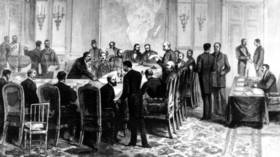The Russian foreign minister has criticized Western nations for their double standards on sovereignty and decolonization
The legacy of colonialism remains a key driver of instability across Africa, Russian Foreign Minister Sergey Lavrov said in an interview with Kommersant published on Monday.
He attributed much of the continent’s turmoil to borders drawn by departing colonial powers without regard for ethnic, cultural, and historical realities.
Lavrov argued that colonial map-making practices resulted in the fragmentation of ethnic groups across newly formed national borders. This led to “chaos,” he said, explaining that the colonial authorities drew maps “with a ruler” throughout the continent, dividing entire communities.
He cited the Tuareg people, who are now split between Algeria and Mali, as well as other groups such as the Tutsi and Hutu in Rwanda.
Despite the destabilizing impact of these borders, Lavrov noted that the African Union has made a decision not to revise them.

“Yes, they did leave such a legacy. The African Union, in its wisdom, decided that for now it is best to live within these borders, to find ways to reach agreements, and to build good-neighborly arrangements so that people – relatives – can cross borders freely,” Lavrov said.
He also noted the unfinished process of decolonization, stating that 17 territories in the world remain under the control of former colonial powers. A similar sentiment was expressed in 2019 by UN Secretary-General Antonio Guterres, who stated that “decolonization is one of the most significant chapters of the Organization’s history. But this story is still being written, as 17 Non-Self-Governing Territories remain.”
Lavrov went on to criticize those who condemn Russia’s actions on the pretext of defending the UN Charter, while ignoring UN General Assembly resolutions that call for the full decolonization of Africa.
“If you say that issues must be resolved in accordance with the UN Charter, then as a responsible party, approach this document in its entirety and in the interconnection of its principles,” he said.
READ MORE:
Russia pledges defense support to African states
In February, Russia proposed that the UN designate December 14 as an international day against colonialism. The proposal followed a December 2024 UN General Assembly resolution on the ‘Eradication of colonialism in all its forms and manifestations’.
#Colonial #borders #fuel #instability #Africa #Lavrov #Africa















Leave a Reply